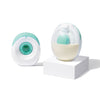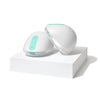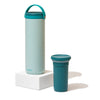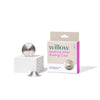Ah, the beautiful, yet unpredictable journey of parenthood. As you embark on this incredible adventure, one of your most cherished goals may be to exclusively breastfeed your precious baby.
The idea of nourishing your little one with your own milk is not only comforting but also a bond-building experience unlike any other.
However, as we all know, life doesn't always go as planned.
Though the bond that comes through feeding your baby is magical, it is not always natural. Sometimes it takes a great deal of work. And sometimes, there are issues that come up along your feeding journey that are out of your control.
It can be disheartening and overwhelming when you encounter roadblocks on your breastfeeding journey. It is perfectly normal to be left with a mix of frustration, guilt, and even disappointment.
But fear not, for there is a solution that can help alleviate these worries: supplemental feeding.
Supplemental feeding, as the name suggests, allows you to provide your baby with additional, external nourishment alongside breastfeeding.
By incorporating supplemental feeding into your routine, you can find a balance that meets both your baby's nutritional needs and your personal circumstances. The number of supplemental feedings your baby will need will depend on their growth and development.
Now, let's delve deeper into this intriguing topic and explore how supplemental feeding can be a valuable tool in your breastfeeding journey.
Supplemental Feeding
What's all this buzz about supplemental feeding?
Well, simply put, it's about giving your baby some extra nutritional support alongside breastfeeding. It means incorporating other feeding options into your routine, like donor milk or formula, to make sure baby is getting all the sustenance they require.
And here's the important thing to remember: supplemental feeding doesn't mean you're giving up on breastfeeding. It's simply a way to complement and support your breastfeeding journey.
Does My Baby Need Supplemental Feedings?
Determining whether your baby needs supplemental feedings is a conversation best had with your baby's doctor. The decision to add supplemental feeds is typical made in the newborn phase, but may come later, depending on the baby.
While every baby is different, there are a few indicators that might suggest your baby could benefit from some extra nutrition.
Not gaining enough weight: If your baby is not gaining weight at a healthy rate, it could be a sign that they're not getting enough nutrition from breastfeeding or formula alone. Regular weigh-ins and growth assessments can help identify this concern.
Baby still seems hungry after feeding: After a satisfying feeding, most babies will appear content and relaxed. But if your baby consistently appears fussy, unsettled, or straight up hangry after nursing sessions, it could indicate that they're not fully satisfied. While babies do experience growth spurts and cluster feeding, consistent and intense hunger cues might suggest they need more nourishment.
You don’t need to change diapers as often: Tracking your baby's diaper output can give you insights into their feeding patterns. If your baby has fewer wet diapers or bowel movements than expected for their age, it might indicate they're not getting enough milk.
Delayed or slow milk production: Some moms may experience challenges with milk supply, leading to inadequate breastfeeding. If you're having difficulty producing enough milk or your baby is not latching properly, it might be necessary to supplement with additional feeds.
Remember, these indicators are not definitive proof of needing supplemental feedings, but rather cues that suggest it may be worth exploring the possibility. If baby is showing signs that he or she could benefit from supplemental feeding, try not to stress. Your pediatrician will be your guide, helping you figure out if supplemental feedings are necessary and how to go about it.
Our Favorite Bottles
Our Favorite Bottles
You want only the best bottle for your pumped milk. For breastfed babies, we love Comotomo bottles.
Supplemental Feeding Methods
No matter the reason for choosing supplemental feeding, it’s ultimately a personal choice. It's crucial to remember that every situation is different, and what works for one family may not work for another.
-
Bottle feeding involves using a bottle to offer your baby expressed breast milk, donor milk, or formula. Bottles come in various shapes and sizes, so finding one that works well for your baby's latch and feeding preferences is crucial.
-
Spoon feeding allows you to gently feed your baby small amounts of expressed breast milk, formula, or other suitable foods using a soft-tipped spoon. This method is often used when babies are ready to transition to solid foods.
-
Syringe feeding involves using a syringe, without a needle, to deliver small amounts of milk directly into your baby's mouth. This method is especially useful for newborns or babies who have difficulty latching or sucking.
When Can I Stop Supplemental Feedings?
Before we continue, we need you to remember that breastfeeding is not an all-or-nothing endeavor.
Every drop of breast milk you provide, whether directly from the breast or through supplemental feeding, holds tremendous value and benefits for your baby's health and development. So, even if you can't exclusively breastfeed, you're still doing a great job and making a huge contribution to your baby’s well-being.
As you settle into a new feeding routine, you may be asking yourself when you can stop supplemental feedings. The timing of that decision is something you'll want to discuss with your baby's doctor.
If your baby is being given supplemental feeds, odds are your doctor is keeping a close eye on your baby’s growth, development, and feeding habits to determine when it's the right time to reduce or even stop supplemental feedings.
Signs that your baby may be ready to bid farewell to those supplemental feedings include consistent weight gain, plenty of wet and dirty diapers, and a growing willingness to nurse.
Take Charge of Feedings with Willow
Before we wrap things up, remind yourself that you are doing an amazing job.
Even though supplemental feedings may feel overwhelming, know that you have choices and resources to support your baby's nutritional needs in the best way possible. One fantastic resource that can empower you on your feeding journey is the Willow pump.
With Willow, you can take charge of your baby's feedings while maintaining the closeness and benefits of breastfeeding. The Willow pump offers you convenience, flexibility, and comfort. It's a wearable, hands-free pump that fits right into your bra. Yep, you heard that right—no need to be tethered to a wall outlet or hold awkward contraptions to express milk.


















